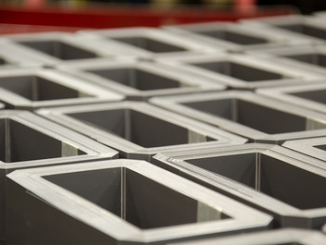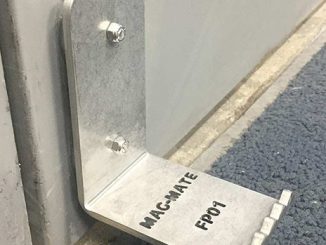
Tokyo-based Minebea Mitsumi and its Yokahama-based subsidiary Ablic are expanding their businesses in power electronics, sensing and precision motion with recent acquisition moves that add more semiconductor capability. Minebea is planning to purchase Hitachi’s power device business, while Ablic recently acquired Samurai Semiconductor. Both deals further build synergies in the combined product lines, many of which involve magnetic technology – particularly with Minebea’s line of precision motors and Ablic’s Hall effect magnetic sensing ICs.
On November 3, Minebea disclosed that it entered into agreement to acquire Hitachi Power Device and make it a subsidiary. Minebea’s analog semiconductor business, which also covers power semiconductors, includes magnetic sensors along with lithium-ion battery protection ICs, power management ICs, timer ICs, MEMS sensors and automotive memories. Now, it aims to further expand the business in the power semiconductor space, including IGBTs, and eventually expand its analog semiconductor business and increase the business value, achieving growth in sales from the current 80 billion yen level to 300 billion yen by 2030 in that field with help of M&A. Hitachi Power Device manufactures power semiconductors which are key devices in the electrification and motorization of industries and social infrastructure.
Minebea also produces an extensive line of precision motors including HDD Spindle motors, small brushless motors and PM stepper motors serving a broad array of applications for its OEM customers. A few examples are shown here.
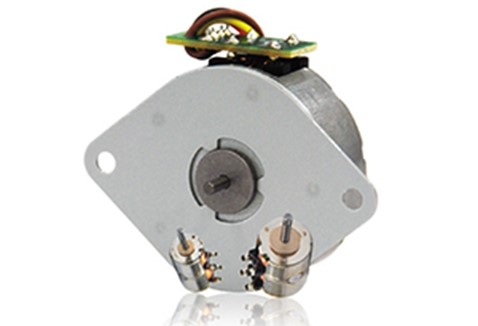
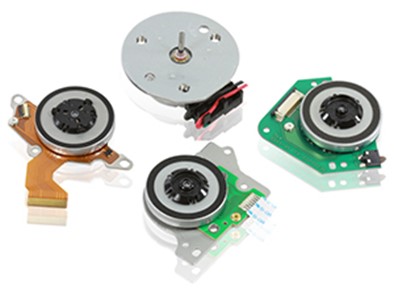
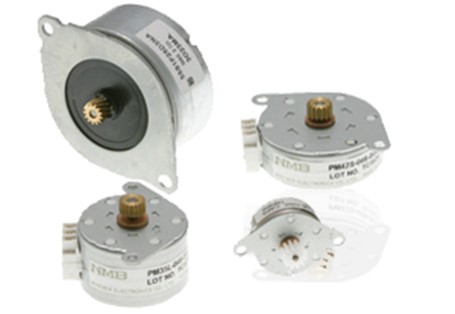
Most of the parts from shaft and hub, stator and magnet, other than winding and lead wires are produced in-house at a company factory, giving MinebeaMitsumi an edge in terms of quality, supply capabilities, manufacturing cost and speed of delivery. Integral molding of a stator, for example, reduces assembly processes, thereby making automatic assembly possible.
Ablic adds Samurai Semi
Earlier in the year, in April, subsidiary Ablic which has an extensive lineup of magnetic Hall effect sensors, purchased Samurai Semiconductor to strengthen development capabilities for high value-add products for automotive and other applications. Based in Yokohama, Samurai is known for its team of
engineers in digital and analog, front-end and back-end, which enables them to develop products in a single integrated manner. With devices such as lithium-ion battery protection ICs, automotive power supply ICs, magnetic sensor ICs (Hall effect ICs), and EEPROMs, Ablic serves applications for automotive devices, medical equipment and IoT/wearable devices.
”Ablic’s growth strategy for the future is to expand lithium multi-cell related products for automotive and other applications, as well as products for medical equipment. By combining SSC’s advanced engineering and design expertise with Ablic’s accumulated engineering and development skills and know-how, we will be able to further accelerate and expand this growth strategy and solidify our path to continuous growth,” said Nobumasa Ishiai, president and CEO of Ablic.
Ablic joined as one of the MinebeaMitsumi Group companies only three years ago, in April 2020, and offers a range of magnetic sensor ICs for various applications. Applicable to various detection types due to their fast response time and wide selection range of magnetic sensitivity, magnetic sensor ICs are now replacing traditionally used reed switches and mechanical switches in many applications, notes the company.
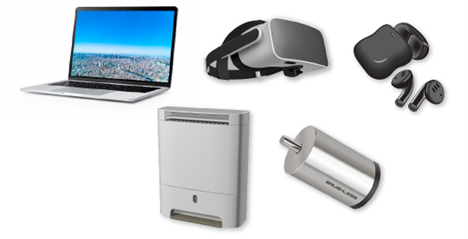
Magnetic simulation service from Ablic
As design engineers explore their options, Ablic offers a magnetic simulation service to help guide the investigation. Since a magnetic field generated from magnets cannot be seen with the naked eye, a magnetic simulation is a technical method of visualizing invisible magnetism by quantifying the distribution and strength of the generated magnetic field. Ablic’s magnetic simulation expresses the magnetism image in a curve or waveform graph, based on the mechanism operation that the customer is considering to adopt.
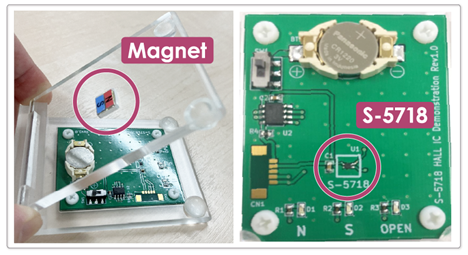
To achieve reliable application functions, the company explains, it is necessary to consider the magnetic field around the magnetic sensor IC in the mechanical design. During the design process, if the size/type/arrangement of the magnet is changed, the position of the magnet detected by the magnetic sensor IC will change – therefore, repeated prototype evaluations are necessary, resulting in the loss of a lot of time, effort and cost. By using ABLIC’s magnetic simulation service, the customer can reduce the number of designs, prototypes and man-hours, and confirm the target magnetic properties and operation results within a short period of time.
For more info, see www.minebeamitsumi.com and www.ablic.com.

